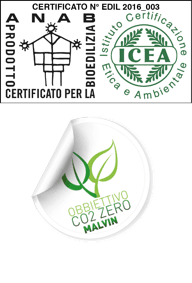Environmentally-sustainable production
We meet our environmental commitments by incorporating all the common sense indications to reduce CO2 emissions, to reduce energy usage and to use renewable energies, thus taking on board all the indications of European directives, bio-building and eco-sustainability.
In this perspective, Malvin's first step was to adopt the environmental management system according to ISO 14001:2004, the ISO 9001:2008 quality management system, the certification of the FPC production process and the adaptation of all its products to European regulatory diktats.
With the environmental management system ISO 14001:2004, Malvin conducts constant environmental surveillance and monitoring that allows us to measure the company's impact on the environment. We then install systems (plants, equipment and machinery) to prevent, restrict or eliminate the environmental effects of our activities and use processes, practices, materials or products to prevent, reduce or control pollution. The changes include altering processes and control systems, recycling, the efficient utilisation of resources and substituting materials for eco-friendly alternatives.
We also operate an awareness-raising process for our staff so their behaviours, actions and mentalities are in line with our environmental objectives and programmes.
With the achievement of the ISO 9001:2008 Quality Management system certification, Malvin has created an operating process to comply with the technical requirements of national and EU technical regulations and specific customer requirements.
FPC, the Productive Process Certification, is a permanent internal control system governing production, verified by an independent third body, authorised by the Central Technical Service of the Superior Council of Public Works. It aims to guarantee mortar uniformity, through our internal laboratory and the implementation of a quality-check system during the production phases and on the finished product.
Our products conform to:
- Legislative Decree 27 March 2006 No 161, implementing EU Directive 2004/42/EC for the limitation of emissions of VOCs in order to prevent air pollution and to ensure the habitability of internal environments and user health.
- Ministerial decree 10.05.2004, using cements treated with reducing agents to break down the water-soluble Chrono VI, thus guaranteeing user safety. The second step was to purchase raw materials from convenient suppliers within a radius of 50km and suppliers who use renewable energies to minimise pollution. The third step was the adoption of eco-sustainable products to reduce the environmental impact connected to the construction sector and safeguarding the territory and the environment in line with UNI EN ISO 14021. This describes the creation of environmentally-sustainable products that guarantee a minimal environmental impact and safeguards the psycho-physical wellbeing of man and to reduce or eliminate the sources of pollution in product production and disposal. The fourth step was to create an 'eco company' with zero CO2 emissions, a goal which was attained in 2012 with the installation of a solar power system that is able to meet the company's energy needs.
It would be ridiculous for a manufacturing company to talk about eco-sustainability while it pollutes the ecosystem. The last goal Malvin attained was to obtain the certification of organic product lines with the ANAB-ICEA, in accordance with the UNI EN ISO 14024 type I environmental labelling.
Eco-sustainable products
Malvin has been working to innovate construction systems since the 80s, offering a range of efficient energy-saving products born from research and experimentation in our RESEARCH AND DEVELOPMENT LABORATORY and from our on-site experience. We specialise in constructing efficient and sustainable buildings and for refitting existing buildings to be more energy-efficient and environmentally friendly, particularly in terms of heat and acoustics. Trust our team of professionals to help you plan, with verifications, calculations and projections, and execute that plan effectively.
Strengths
- Present throughout central/southern Italy
- The quality of our products, thanks to technologically-advanced equipment, 40 years of construction experience (starting out as users and then as suppliers), and constant experimentation that takes place in our R&D laboratory at MALVIN with quality control at the first and final stages.
- Skill and technical assistance in determining the proper solution for every challenge in the construction industry alongside the continuing and constant availability to the client before, during and after the project both over the phone and on-site.
- Presence of agents/technicians who are ready to respond to clients' needs throughout our territory.
- Logistical support available, no expense spared, so we can quickly respond to any client need with assistance by road, train, crane or even single platforms.
- On-site support with installation of silos and the most cutting-edge equipment (under-silo mixers, floor mixers, pumping plants) to simplify and accelerate the work.
- Rental and sale of 220v/380v plastering machines, screeds machines, pumping plants, electric power generators and mixers.
- Technical service available both on- an off-site, with 4 technicians on-hand to perform repairs if a machine breaks down or replace it immediately in the case that it cannot be immediately repaired.
- Constant research and development to ensure our products are always of the highest quality in terms of always being able to respond to each and every demand of the market and to develop new technologies as required.
- All this makes MALVIN a company that is: solid, modern, dutiful and a leader in the construction industry. Able to guarantee its clients innovative and reliable products and a reliable, safe and speedy service. All this is encapsulated in our motto: 'WE SUPPORT YOUR WORK'.










